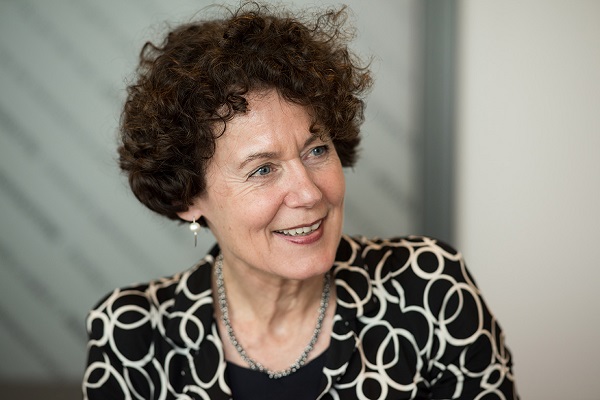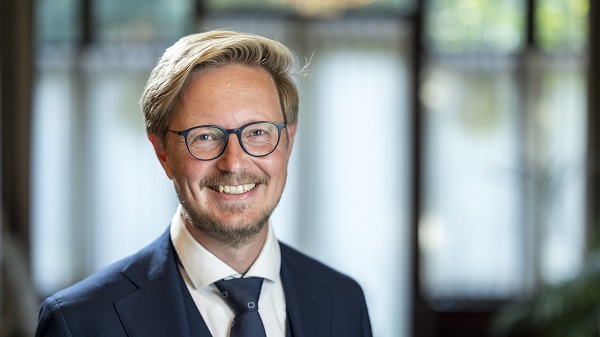Board members in conversation: ‘The best people are not necessarily the people with a Harvard PhD’
The smart, green and healthy region that the Board organizations are working on can only be achieved if organizations in the region work together on it: Geert ten Dam and Robert Metzke are convinced of this. 'Only if you have everyone at the table will you arrive at valuable solutions.'
Like any organization, the corona crisis also affects Philips and the University of Amsterdam. What was 2020 like for you?
Ten Dam: ‘Financially, the crisis hardly affects us, but we notice it all the more in other areas. We made the switch to online education very quickly, with enormous commitment from our employees. A lot of great things have been achieved, but the workload, which was already considerable, has increased significantly. We have kept our buildings open from the start: for vulnerable students and for employees who have too little space at home to do their work properly. The corona crisis affects many people personally. ‘
Metzke : ‘We see that indeed. The influence on families, on young families, on the elderly and caregivers is enormous. But also those on business operations and society. As a health technology company, we have one triple duty of care : we want people to stay healthy, healthcare providers to be able to do their job with our monitoring and respiratory equipment, while ensuring business continuity. This crisis is also an opportunity to reflect on what your purpose is. I saw beautiful things arise in us as a result. Whereas it used to take us two years to develop new respiratory equipment, we now developed a new device within three weeks, because many of our people worked on it 24/7. ‘
“Where it used to take us two years to develop new respiratory equipment, we now developed a new device within three weeks.”
Ten Dam: ‘We have also seen enormous creativity. We had been struggling against the digital threshold for years; we have now taken that step. Now we are thinking about how we can improve the quality of education in the long term with the help of digitization. How we can use the teaching time on campus for qualitative encounters. ‘
Metzke : ‘You can also see this acceleration of digitization in healthcare. COVID has ensured better coordination between intensive care units, more remote care and better digital guidance for patients who are allowed to return home. These are sustainable developments. ‘
Ten Dam: ‘What worries me is that this crisis has further increased the already existing inequality in the Netherlands. You can see that forced homeschooling has only increased differences. In primary and secondary education, but also in secondary and higher education. Not all students have a good study environment at home; not all parents can help their children with school. The pressure on young people was already high. The corona crisis has further exacerbated this. The difference between highly and low-educated people is also reflected in the field of health. The difference in healthy life years between the two groups is more than ten years. ‘

Geert ten Dam, Chairman of the Executive Board of the University of Amsterdam
Metzke: ‘The goal is that everyone in the region will soon have two more healthy years of life. Artificial Intelligence and other technologies should help. We must organize this in an inclusive way, so that it is not only accessible to the higher educated. But that we include the risk groups in this. That they also receive good health education. ‘
You are both involved in the Amsterdam coalition AI Technology for People. It focuses on projects around business innovation, citizens and health. How does this coalition contribute to the smart, green and healthy region?
Ten Dam: ‘We have had high-quality knowledge about data science in Amsterdam for decades. We must ensure that this is made accessible, for the benefit of the region and for the benefit of the Netherlands and Europe. We cannot afford to lag behind and that requires cooperation. We picked up that glove. For a year now, we have been meeting with all knowledge institutions in Amsterdam, the municipality and the Amsterdam Economic Board for a monthly breakfast session – now these are digital eggs, of course – in which we meet and make plans. We bring together the technological side, but also the social, legal and ethical aspects of AI. In addition to Femke Halsema, the committee of recommendations includes CEOs of industry organizations and companies such as Philips. In our labs, public and private parties work together on new knowledge and applications. For example in the field of medical imaging, where we investigate the role machines can play in analyzing images and when the human eye is needed. This is at odds with the old image of valorisation: the knowledge institutions come up with something beautiful which is then made available to companies and social enterprises. Those are really yesterday’s papers. We go together. ‘
Metzke: ‘It is also important that it is not just about technology. I think there is a great opportunity for Amsterdam, perhaps even for Europe, to expand it. We see how China and American tech companies deal with data. We really have an opportunity here to tackle this in a socially responsible manner and to put the rights of citizens and patients at the center and to establish a global export product. For example, we are currently working on projects that use artificial intelligence for smarter management of charging points in the city, but also for a health data platform, for which organizations in the region share data in a sensible way. ‘

Robert Metzke, Global Head Sustainability Philips
Sustainable purchasing can also contribute to that green, smart and healthy region. Both of you have been working on that for a few years. What is your advice to organizations that want too purchasing with impact ?
Ten Dam: ‘Together with the AUAS, we have had a logistics hub in Duivendrecht for five years, which means that trucks no longer have to enter the city for us. That saves a lot of transport movements. I think it is great to see that our size allows us to set sustainability requirements for suppliers. It’s simple: if they don’t cooperate, we go to a party that wants to. In this way we can get entire chains moving. My advice to smaller organizations is to seek cooperation with larger parties. Then you can make a fist together. ‘
“I think it is great to see that our size allows us to set sustainability requirements for suppliers. My advice to smaller organizations is to seek cooperation with larger parties. Then you can make a fist together.”
Metzke: ‘By creating mass you can indeed shake up many other companies. At Philips we have about 50,000 different suppliers. We work with them in the Supplier Sustainability Program on sustainable solutions such as sustainable stock management and responsible purchasing. We invest in relationships with suppliers who provide a safe work environment, treat employees with respect and operate in an environmentally sound manner. We and they measure a lot. Innovations such as AI allow us to focus on structural, proactive improvement and make our programs more efficient and effective.
I think it is important that suppliers and customers continue to have intelligent discussions. If you as a hospital want to provide sustainable care, our question must be: what does that look like? Can we use our EcoDesign experience and knowledge to ensure that your ecological footprint goes down? Any supplier can have these kinds of conversations with their customers. For smaller organizations, I think you mainly start with a simple analysis of your material impact. And then seek advice. ‘
Worldwide there is a lot of competition for talent. How can we as a region ensure that we attract and retain talent, so that we can continue to work together on the metropolitan challenges in the future?
Ten Dam: ‘That is one of the biggest concerns for me. It is not good that the Wopke-Wiebesfonds does not pay special attention to talent. Talents in the field of AI are literally bought away from the UvA, even before they graduate. Our answer to that must be a vibrant ecosystem. A region where there are also jobs for the partners of these people and schools for the children. And a region in which we as knowledge institutions have the doors to other organizations wide open. ‘
Metzke: ‘I don’t think we should look for higher salaries anyway. As a region, we must ensure that we offer quality of life and a sense of purpose in the jobs. At the same time, I also think that we can deal even smarter with existing talent. The best people aren’t necessarily the people with the slickest resumes, with PhDs at Harvard. This can also be people with a distance to the labor market, or people with a non-classical intelligence profile. We also have to find them and give them space. ‘
Text: Mirjam Streefkerk
Board members in conversation
Go in 2020 board members talking to each other about the energy transition. What is their vision for taking steps faster and how are they working on it? This is part six of the series.
- Part 1: Henk Markerink (Johan Cruijff ArenA) and Hans Wichers Schreur (Amsterdam University of Applied Sciences) discuss the energy transition.
- Part 2: Victor Everhardt (Alderman for Economy, Municipality of Amsterdam) and Barbara Baarsma (Rabobank Amsterdam in conversation about the energy transition & the impact of the corona crisis .
- Part 3: Dominique Hermans (Managing Director Randstad Netherlands) and Hans Snijders (Chairman of the Executive Board of Nova College) discuss the energy transition & the impact of the coronacrisis
- Part 4: Yuri Sebregts (Executive Vice-President Technology and Chief Technology Officer Royal Dutch Shell) and Mirjam van Praag (Chairman of the Board of the VU University) “Our energy system is not sustainable, we have to change now ‘
- Part 5: Ernst Hoogenes (CTO Tata Steel Europe) and Erik Henstra (Managing Director LeasePlan Netherlands): “Only invest in companies that operate sustainably”
Do you want our latest news and the receive upcoming (online) events? follow us on Twitter and LinkedIn and sign up for our monthly Board Update .
24 december 2020
Meer weten over
Neem contact op
Blijf jij ook op de hoogte?
8x per jaar nieuws en events uit de regio: schrijf je in voor de Board Update nieuwsbrief
Deel dit artikel
Wil je op de hoogte blijven?
Volg ons dagelijks op LinkedIn en schrijf je in voor de Board Update nieuwsbrief.
Lees ook deze berichten
- Welke AI-toepassingen zetten we al in voor zorg- en welzijn? Wat is ...
- Adyen is een van de grote succesverhalen van het Amsterdamse tech-ecosysteem. Als ...
- Samen met bevlogen partners bouwt Amsterdam Economic Board in drie coalities aan ...

